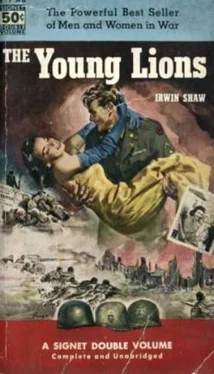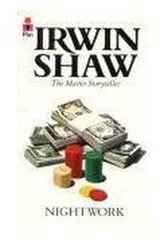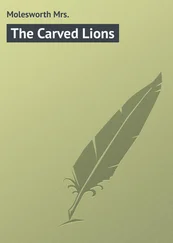Irwin Shaw - The Young Lions
Здесь есть возможность читать онлайн «Irwin Shaw - The Young Lions» весь текст электронной книги совершенно бесплатно (целиком полную версию без сокращений). В некоторых случаях можно слушать аудио, скачать через торрент в формате fb2 и присутствует краткое содержание. Жанр: Классическая проза, на английском языке. Описание произведения, (предисловие) а так же отзывы посетителей доступны на портале библиотеки ЛибКат.
- Название:The Young Lions
- Автор:
- Жанр:
- Год:неизвестен
- ISBN:нет данных
- Рейтинг книги:4 / 5. Голосов: 1
-
Избранное:Добавить в избранное
- Отзывы:
-
Ваша оценка:
- 80
- 1
- 2
- 3
- 4
- 5
The Young Lions: краткое содержание, описание и аннотация
Предлагаем к чтению аннотацию, описание, краткое содержание или предисловие (зависит от того, что написал сам автор книги «The Young Lions»). Если вы не нашли необходимую информацию о книге — напишите в комментариях, мы постараемся отыскать её.
The Young Lions — читать онлайн бесплатно полную книгу (весь текст) целиком
Ниже представлен текст книги, разбитый по страницам. Система сохранения места последней прочитанной страницы, позволяет с удобством читать онлайн бесплатно книгу «The Young Lions», без необходимости каждый раз заново искать на чём Вы остановились. Поставьте закладку, и сможете в любой момент перейти на страницу, на которой закончили чтение.
Интервал:
Закладка:
"Why don't you come with me?"
"What?"
"Come along with me," Noah repeated. "You'll have a lot better chance of coming out of the war alive if you go into a company where you have friends. You have no objections to coming out of the war alive, have you?"
"No," Michael smiled weakly. "Not really." He did not tell Noah of the times when it hadn't seemed to make much difference to him whether he survived or not, some of the rainy, weary nights in Normandy when he had felt so useless, when the war had seemed to be only a growing cemetery, whose only purpose seemed the creation of new dead; or the bleak days in the hospital in England, surrounded by the mangled product of the French battlefields, at the mercy of the efficient, callous doctors and nurses, who would not even give him a twenty-four-hour pass to visit London, to whom he had never been a human being in need of comfort and relief, but merely a poorly mending leg that had to be whipped back into a facsimile of health so that its owner could be sent back as soon as possible to the front. "No," Michael said, "I don't really mind the idea of being alive at the end of the war. Although, to tell you the truth, I have a feeling, five years after the war is over, we're all liable to look back with regret to every bullet that missed us."
"Not me," said Noah fiercely. "Not me. I'm never going to feel that."
"Sure," Michael said, feeling guilty. "I'm sorry I said it."
"You go up as a replacement," said Noah, "and your chances are awful. The men who are there are all friends, they feel responsible for each other, they'll do anything to save each other. That means every dirty, dangerous job they hand right over to the replacements. The Sergeants don't even bother to learn your name. They don't want to know anything about you. They just trade you in for their friends and wait for the next batch of replacements. You go into a new Company, all by yourself, and you'll be on every patrol, you'll be the point of every attack. If you ever get stuck out some place, and it's a question of saving you or saving one of the old boys, what do you think they'll do?"
Noah was speaking passionately, his dark eyes steady and intense on Michael's face, and Michael was touched by the boy's solicitude. After all, Michael remembered, I did damn little for him in his trouble in Florida, and I was no great comfort to his wife back in New York. He wondered if that frail dark girl had any notion of what her husband was saying now on the wet plain outside Paris, any notion of what subterranean, desperate reasoning a man went through in this cold, foreign autumn so that he could one day come back and touch her hand, pick up his son in his arms… What did they know about the war back in America, what did the correspondents have to say about the replacement depots in their signed pieces on the front pages of the newspapers?
"You've got to have friends," Noah was saying fiercely. "You can't let them send you anywhere where you don't have friends to protect you…"
"Yes," Michael said gently, putting out his hand and touching the boy's wasted arm, "I'll go with you."
But he didn't say it because he felt that he was the one who needed friends.
CHAPTER THIRTY-TWO
A CHAPLAIN in a jeep picked them up on the other side of Chateau-Thierry. It was a grey day and the old monuments among the cemeteries and the rusting wire of another war looked bleak and ill-tended. The Chaplain was quite a young man, with a Southern accent, and very talkative.
It started to rain. Curtains of water poured down over the ancient earthworks and the rotting wooden posts that had supported the wire in 1917. The Chaplain slowed down, peering through the clouded windshield. Noah, who was sitting in the front seat, worked the manual wiper to clear the glass. They passed a little fenced-off plot next to the road where ten Frenchmen had been buried on the retreat in 1940. There were faded artificial flowers on some of the graves, and a little statue of a saint in a glass case on a grey wood pedestal. Michael looked away from the Chaplain, thinking vaguely of the overlapping quality of wars.
The Chaplain stopped the jeep abruptly, and backed it down the road towards the little French cemetery.
"That will make a very interesting photograph for my album," the Chaplain said. "Would you boys mind posing in front of it?"
Michael and Noah climbed out and stood in front of the neat little plot. "Pierre Sorel," Michael read on one of the crosses, "Soldat, premiere class, ne 1921, mort 1940." The artificial leaves of laurel and the dark memorial ribbon around them had run together in streaks of green and black in the long rains and the warm sun of the years between 1940 and 1944.
"I have more than a thousand photographs I've taken since the war began," said the Chaplain, busily working on a shiny Leica camera. "It will make a valuable record. A little to the left, please, Boys. There, that's it." There was a click from the camera. "This is a wonderful little camera," the Chaplain said proudly. "Takes pictures in any light. I bought it for two cartons of cigarettes from a Kraut prisoner. Only the Krauts know how to make good cameras, really. They have the patience we lack. Now, you boys give me the address of your families back in the States, and I'll make up two extra prints, and send them back to show the folks how healthy you are."
Noah gave the Chaplain Hope's address, care of her father in Vermont. The Chaplain carefully wrote it down in a pocket notebook with a black leather cover and a cross on it.
"Never mind about me," Michael said, feeling that he didn't want his mother and father to see a photograph of him, thin and worn, in his ill-fitting uniform, standing in the rain before the ten-grave roadside cemetery of the lost young Frenchmen.
"I don't like to bother you, Sir."
"Nonsense, Boy," said the Chaplain. "There must be somebody who'd be right happy with your picture. You'd be surprised, all the nice letters I get from folks whose boys' pictures I send them. You're a smart, handsome young feller, there must be a girl who would like to put your picture on her bed table."
Michael thought for a moment. "Miss Margaret Freemantle," he said, "26 West 10th Street, New York City. It's just what she needs for her bed table."
While the Chaplain scratched away in his notebook, Michael thought of Margaret receiving the photograph and the note from the Chaplain in the quiet, pleasant street in New York. Maybe now, he thought, she'll write… Although what she'll have to say to me, and what I might possibly answer, I certainly don't know. Love, from France, a million years later. Signed, Your interchangeable lover, Michael Whitacre, Army Speciality Number 745, from the grave of Pierre Sorel, ne 1921, mort 1940, in the rain. Having a wonderful time, wish you were…
They got into the jeep again and the Chaplain drove carefully along the narrow, high-backed, slippery road with the marks of tank treads and a million heavy army wheels on it.
"Vermont," the Chaplain said pleasantly to Noah, "that's a pretty quiet section of the country for a young feller, isn't it?"
"I'm not going to live there," Noah said, "after the war. I'm going to move to Iowa."
"Why don't you come to Texas?" the Chaplain said hospitably. "Room for a man to breathe there. You got folks in Iowa?"
"You might say that," Noah nodded. "A buddy of mine. Boy by the name of Johnny Burnecker. His mother's found a house we can have for forty dollars a month, and his uncle owns a newspaper and he's going to take me on when I get back. It's all arranged."
"Newspaperman, eh?" the Chaplain nodded sagely. "That's the lively life. Rolling in money, too."
"Not this newspaper, " Noah said. "It comes out once a week. It has a circulation of 8, 200."
Читать дальшеИнтервал:
Закладка:
Похожие книги на «The Young Lions»
Представляем Вашему вниманию похожие книги на «The Young Lions» списком для выбора. Мы отобрали схожую по названию и смыслу литературу в надежде предоставить читателям больше вариантов отыскать новые, интересные, ещё непрочитанные произведения.
Обсуждение, отзывы о книге «The Young Lions» и просто собственные мнения читателей. Оставьте ваши комментарии, напишите, что Вы думаете о произведении, его смысле или главных героях. Укажите что конкретно понравилось, а что нет, и почему Вы так считаете.











